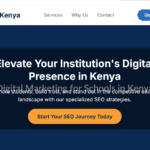SEO for Education Institutions in Kenya
- Delivery Time2 Weeks
- English levelProfessional
- LocationUSA, United Kingdom, United Arab Emirates, New York, Nairobi, Kilimani, Kenya, Dubai, CBD Nairobi, Canada, Australia
Service Description
The cost of SEO for Education Institutions in Kenya is 80000KES per month.Get the cost of SEO for Education Institutions in Kenya at a price of 30000KES per mmonth at Black Shepherd Technologies.
Boost enrollment and visibility for your Kenyan school with expert SEO. Our services for educational institutions in Kenya help you rank higher on Google, attract qualified student leads, and build a strong online reputation. From local SEO to content marketing, we connect you with the right students.
In today’s digital-first world, a strong online presence is no longer a luxury but a necessity for educational institutions in Kenya. Search Engine Optimization (SEO) for schools, colleges, and universities is the strategic process of optimizing a website to rank higher in search engine results pages (SERPs), primarily on Google, to attract more organic traffic. This translates into increased inquiries, applications, and ultimately, higher enrollment.
The Kenyan education landscape is highly competitive, with numerous institutions vying for the same pool of prospective students and parents. A well-executed SEO strategy is crucial for cutting through this noise and ensuring that when a student searches for “universities offering computer science in Nairobi” or “best international schools in Mombasa,” your institution appears prominently.
The core components of an effective SEO strategy for Kenyan schools can be broken down into three main pillars: on-page SEO, off-page SEO, and technical SEO.
On-Page SEO: The Foundation of Visibility
On-page SEO involves optimizing the individual pages of your website to be more appealing to both search engines and users. This is where you directly communicate what your institution is about and what it offers.
Keyword Research: This is the starting point. It involves identifying the specific words and phrases that your target audience—prospective students, parents, and researchers—are using to find information online. For a Kenyan institution, this could include a mix of broad terms like “higher education Kenya” and more specific, long-tail keywords like “diploma in hospitality management in Nakuru.” It’s essential to understand user intent behind these searches, whether they’re looking for information, a specific course, or contact details.
Content Creation: High-quality, relevant content is the king of SEO. This includes creating compelling, informative, and engaging content that addresses the needs of your audience. This can take many forms:
Detailed Course and Program Pages: Each course should have its own dedicated page with comprehensive details on the curriculum, entry requirements, career prospects, and faculty.
Informative Blog Posts: Articles on topics like “Choosing the right university,” “Tips for KCSE students,” or “The benefits of studying in Kenya” position your institution as a thought leader.
Student Success Stories and Testimonials: Showcasing the achievements of your alumni and current students provides powerful social proof and builds trust.
Virtual Tours and Videos: Visual content, such as videos of campus life or virtual tours, is highly engaging and can be optimized for search engines to attract visitors.
Meta Descriptions and Title Tags: These are the clickable headlines and brief descriptions that appear on a search engine results page. Crafting unique, keyword-rich, and compelling titles and descriptions for every page is vital for improving click-through rates (CTR). For the Kenyan context, this can also include local-specific information to attract students from a particular region.
Off-Page SEO: Building Authority and Trust
Off-page SEO focuses on activities that happen outside your website to build its authority and credibility.
Link Building: This involves acquiring high-quality backlinks from reputable websites. When a respected educational blog, news outlet, or a government education portal links to your site, it signals to search engines that your institution is a trustworthy and authoritative source. Strategies for this can include guest blogging, creating shareable content, and building relationships with other institutions and organizations in the education sector.
Local SEO: This is particularly important for physical institutions. Optimizing your Google Business Profile (formerly Google My Business) is crucial for appearing in local search results and on Google Maps. This involves ensuring your name, address, and phone number (NAP) are consistent across all online directories, gathering positive reviews, and responding to feedback. For institutions with multiple campuses, optimizing for each specific location is key.
Social Media Engagement: While social media isn’t a direct ranking factor, a strong social media presence can drive traffic to your website, increase brand awareness, and lead to more people searching for your institution by name. Sharing your content and engaging with your community on platforms like Facebook, Twitter (X), Instagram, and LinkedIn is an important part of a holistic SEO strategy.
Technical SEO: Ensuring a Healthy Website
Technical SEO ensures that your website is properly structured and functioning, making it easy for search engine crawlers to access, understand, and index your content.
Mobile-Friendliness: With a significant portion of internet users in Kenya accessing the web via mobile devices, having a responsive, mobile-first website is non-negotiable. Google uses mobile-first indexing, meaning a poor mobile experience can severely harm your rankings.
Website Speed: Page load speed is a critical ranking factor and a major determinant of user experience. Slow-loading websites have higher bounce rates. Optimizing images, minifying code, and using a reliable hosting service are essential for a fast website.
Site Structure and Navigation: A logical, user-friendly website structure makes it easy for both users and search engine crawlers to navigate your site. This includes a clear hierarchy of pages and a well-organized internal linking structure.
In conclusion, SEO for educational institutions in Kenya is a continuous and multifaceted process that goes beyond simply getting a website online. It’s about strategically positioning your institution to be discovered by the right audience at the right time, building a digital reputation that reflects your academic excellence, and ultimately, driving sustainable growth in enrollment in the competitive Kenyan market.








